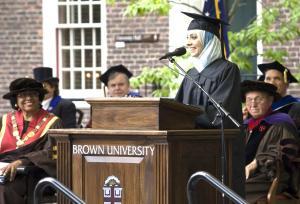Last semester, I was watching TV with my suitemates when the now-infamous political ad came on. In a menacing voice the spokesman stated: “It’s 3 a.m. and your children are asleep, there's a phone in the White House, and it’s ringing. Your vote will decide who answers that call.”
Sadly, messages like this were not unusual during this past election season. Across political lines, parties attempted to sway public opinion through the use of fear, while failing to acknowledge the inherent injustice enveloped in these statements.
Fortunately, here at Brown the trademark lesson we’ve learned is to take nothing at face value. In doing so, we can uncover the truths and hidden messages necessary for informed decision-making. Because ultimately, the real value of our Brown education will be assessed by our ability to make the world a more just, peaceful, and equitable place for generations to come.
The use of fear as a political tool was prominently manifested in the context of President Barak Obama’s campaign. President Obama’s very legitimacy was put into question by one word: “Muslim.” Media outlets featuring so-called experts announced that they had found THE smoking gun that pointed to Obama’s alleged Muslim identity. His middle name, “Hussein,” was the first big clue. Then there was the accusation that, as a child, Obama attended a madrassa, a simple Arabic term meaning “school.” But nothing could have been more telling of Obama’s hidden Muslim identity, and therefore, of course, his terrorist connections, than the renowned fist bump with Michelle Obama.
The accusations of being Muslim, and all of the negative connotations and fear associated with it, were enough to shake the very future of Barak Obama’s presidential campaign, while simultaneously maligning an entire segment of our global society.
Only one American leader, Colin Powell, had the courage to openly expose the assumptions behind the accusations when he said, “Barack Obama is not Muslim, he’s Christian; but what if he were Muslim? Is there something wrong with being a Muslim in this country? The answer’s No. ... Is there something wrong with some seven-year-old Muslim-American kid believing that he or she could be president?”
As we know, in spite of the fear-mongering, Barack Obama was elected. On January 20, 2009, I sat front row in a packed Salomon Hall with hundreds of my fellow Brown students watching the inauguration of our first biracial president. We all sat on the edges of our seats, watching a historic moment.
In Obama’s first speech as president, he said, “We know that our patchwork heritage is a strength, not a weakness. ... We are shaped by every language and culture, drawn from every end of this Earth ... and as the world grows smaller, our common humanity shall reveal itself; and [we] must play its role in ushering in a new era of peace.”
Granted, this is not an easy task. Accomplishing this vision would require that we, as a people voice our opinions, but not so loudly that we can’t hear and empathize with the opinions and circumstances of others. It would require us to forgo media over-simplification of entire nations and peoples, in favor of reaching across the threshold, just to listen. It would require putting our egos aside and our belief that we know what’s best in order to understand why someone might think otherwise. And this would have to continue even in the midst of crisis when polarization threatens to fuel the fires of violence.
Yet we as Brown students have already taken the most important steps. During our four years here, students of all backgrounds and nationalities have debated, petitioned, argued, engaged, protested, challenged, and fought to break apart every preconceived notion thrown at us.
At Brown we have established a community strengthened by our differences and energized by our passions for a common good. We have realized that the freedoms we seek are inextricably linked with the freedoms of others; we have realized that the compassion we desire requires that we recognize ourselves and our humanity in the faces of those around us. If each of us can hold onto this awareness as we enter the greater community, the walls of fear that aim to constantly divide us will begin to crack.
In a world that, at times, seems so set on dividing itself on the basis of differences, I have witnessed 1,445 people from 44 countries meet, initially as strangers, then come together as colleagues, who question, debate, and, sometimes, passionately disagree, but in the end, stand united as the Class of 2009. In this I root my trust and my confidence. It is with the Brown spirit of understanding and common humanity that I affirm my dreams for our future.
I am truly honored to be a member of the Brown Class of 2009. My fellow graduates, congratulations to us all!

